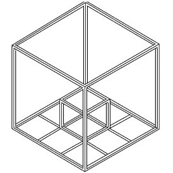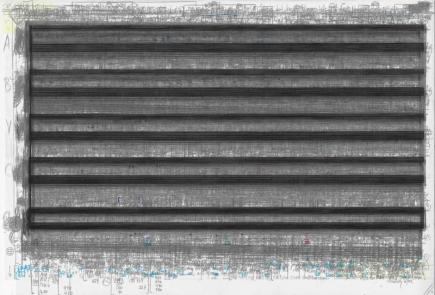“Central to the new-music experience in New York.”
– Time Out NY
“Central to the new-music experience in New York.”
– Time Out NY


SYNCRETICS SERIES: ERIC WUBBELS / ADAM TENDLER
Chris McIntyre, curator
Sat 17 Feb, 2018, 8pm
Tickets
($15 - 12) ALL-ACCESS
ISSUE Project Room
22 Boerum Place, Brooklyn, NY 11201
Saturday, February 17th, ISSUE presents the second evening of our recently inaugurated Syncretics Series, a series of concerts featuring solo and duo performances by artists at highest level of their craft curated by Chris McIntyre. The evening features Eric Wubbels, acclaimed composer, pianist, and co-director of the Wet Ink Ensemble, performing his own compositions including the premiere of a new solo piano work and a recent duo for trombone and piano, as well as pianist Adam Tendler performing a repertoire of works from David Lang, Elodie Lauten, Frances Rose White, and Tom Johnson.
Eric Wubbels presents the first work in a major new project of music for the piano, which will eventually encompass ten to fifteen virtuosic works written for a cohort of some of the most forward-thinking, technically adept, and creative pianists currently working in New York City (including Conor Hanick, Conrad Tao, Kris Davis, Craig Taborn, and Matt Mitchell). He also presents his 2016 piece contraposition for trombone and piano. Written for and performed here by trombonist Weston Olencki, the work explores concerns of virtuosity, synchronization, and hybridization using unique languages developed through Wubbels’ and Olencki’s intensive long-term collaboration.
Adam Tendler presents a selection of unique works chosen especially for ISSUE. Tendler explains, “When [curator] Chris McIntyre invited me to participate in this concert, I felt grateful and honored. But mostly relieved. It's true. I explained at the time that I had accrued a virtual lagoon of pieces that I’d either learned or wanted to learn, but that seemed to only fit a platform like ISSUE, and that I found myself only gently nudging for opportunities to present but mostly waiting for the right one. Finally, with this February 17th concert, a couple of them will have a home.”
He continues, “these works, I felt, required a certain intimacy space-wise, but also austerity in the environment. They themselves must fill the space—not a grand concert hall, but not a house salon, either. They have a darkness, or perhaps need darkness. They pulse with a raw, hungry, ambitious immediacy. They are seminal. Young. A little reckless. They pull from the world around them and demand a lot from the performer and listener. They’re anomalies. Islands. At once extroverted and yet also cerebral and intensely personal. Even if in retrospect these works appear unique in each composer’s output, or “of a time,” it is precisely that time and feeling that I want to capture in this brief set of works for piano, and piano/tape from the 70s and 80s.”
Tendler’s notes on his presented repertoire are shown below, highlighting the idiosyncratic character of each piece:
David Lang: while nailing at random (1983)
I think of this as Lang’s Sequenza, his Piano Variations. His “ten minute monster,” to borrow Copland’s term.The only work on the program without a tape element, the piece (I think, importantly) shows a younger Lang composing music with the tenderness of a buzzsaw. And yet one can still hear glimpses of the understated, obsessive, often melancholy work that would later, some might argue, come to define the composer’s unique sound.
Elodie Lauten: Imaginary Husband (c.1983)
I hope that this realization will represent the first of several to follow. A lovely, haunting chord progression blends with ghost voices and drones from a subtle tape part. I will attempt to track down any sketches or a possible surviving tape, however I think the piece can be effectively recreated while capturing the energy of Lauten’s legendary live performances and fluid compositional approach.
Frances Rose White: Still Life with Piano (1989)
For over two years I've stared at White's Still Life with Piano hoping to play it. She wrote the work for her now-husband, James Pritchett, during the beginning of their relationship, and he premiered it. Spare but feisty pointillistic piano gestures flit above a bed of warm electronica. Ahead of its time and seldom performed, this is the kind of piece my mind conjures when I think of what I want a tape/piano piece to sound and look like. And I adore Frances Rose White.
Tom Johnson: Triple Threat (1979)
This is a barn-burner of a piece that is truly for tape and piano, with the performer using a 4-track cassette recorder to overdub spoken text and an interlocking piano texture. As one might expect from Johnson, the text is about the piece, and namely about how difficult it is to perform, with memorized text to be recited during the rewinding portions. If it works, it works! If it doesn't, well... then the piece proves itself right. But I think this will serve as a fun, cheeky and quite-perfect postcard from the loft-concert era, where composers emerged from the watershed freedoms of minimalism to push, blur and destroy concert-hall boundaries and expectations, exploring new horizons of sound and technology.
Eric Wubbels (b.1980) is a composer, pianist, and Co-Director of the Wet Ink Ensemble. His music has been performed throughout Europe, Asia, Australia, and the U.S., by groups such as Wet Ink Ensemble, Mivos Quartet, yarn|wire, Kupka's Piano (AUS), Berlin PianoPercussion, Ensemble Linea (FR), New York New Music, SCENATET (DK), Hong Kong New Music Ensemble, and Talea Ensemble, and featured on festivals including Huddersfield Festival, Chicago Symphony MusicNOW, New York Philharmonic CONTACT, MATA Festival, and Zurich Tage für Neue Musik. The recipient of a 2016 Charles Ives Fellowship from the American Academy of Arts and Letters, Wubbels has been awarded commissioning grants from Chamber Music America's Classical Commissioning Program, ISSUE Project Room, MATA Festival, Barlow Endowment, Jerome Foundation, New Music USA, and Yvar Mikhashoff Trust, and residencies at the MacDowell Colony (2011, 2016), Djerassi Resident Artists Program, and Civitella Ranieri Center. As a performer, he has given U.S. and world premieres of works by major figures such as Peter Ablinger, Richard Barrett, Beat Furrer, George Lewis, and Mathias Spahlinger, as well as vital young artists such as Rick Burkhardt, Francesco Filidei, Erin Gee, Bryn Harrison, Clara Iannotta, Alex Mincek, Sam Pluta, Katharina Rosenberger, and Kate Soper.He has recorded for Carrier Records, hatART, Spektral (Vienna), New Focus, Albany Records, and Quiet Design and has held teaching positions at Amherst College and Oberlin Conservatory.
Adam Tendler has been called “a virtuoso pianist” by The Village Voice, "exuberantly expressive" by the Los Angeles Times, a "modern music evangelist" by Time Out New York, "musical mastermind" by the Houston Press, and a “quietly charismatic... intrepid... outstanding... maverick pianist” by The New Yorker. He has performed solo recitals in all fifty states, including engagements at Carnegie Hall, Lincoln Center, The Kitchen, (le) poisson rouge, National Sawdust, Rubin Museum, Philadelphia Museum of Art, Rothko Chapel, Joe’s Pub, The Fisher Center at Bard College, Maverick Concert Hall, and James Turrell's Skypace in Sarasota, Florida. His memoir, 88x50, was a 2014 Kirkus Indie Book of the Month and a Lambda Literary Award Nominee. 2015 saw the release of Tendler's premiere recording of Edward T. Cone’s “21 Little Preludes” for piano, and he will record an album of works by Robert Palmer for New World Records in 2018. He also appears on the Tido digital music app, produced by Edition Peters. Adam Tendler lives in Brooklyn, serves on the faculty of Greenwich House Music School and Third Street Music School Settlement, and performs in the radical new music collective, Tenth Intervention. He is working on his second book.
Photo: Eric Wubbels’ being-time, released in November 2017.
Yamaha CFX concert grand piano graciously provided by Yamaha Artist Services, New York.